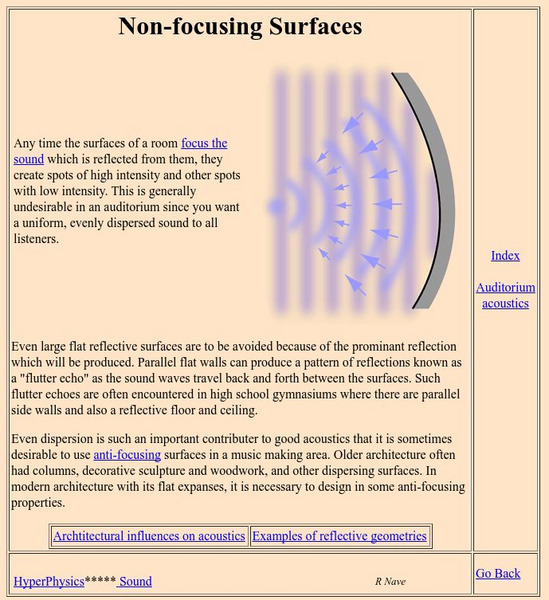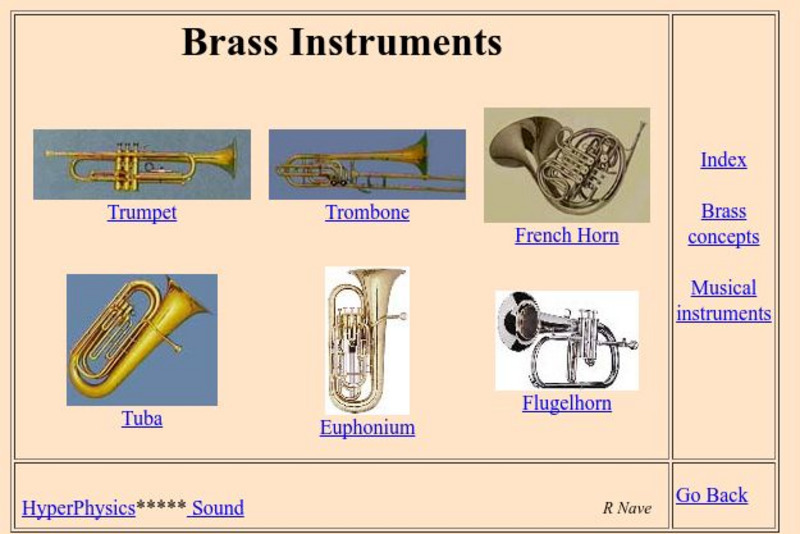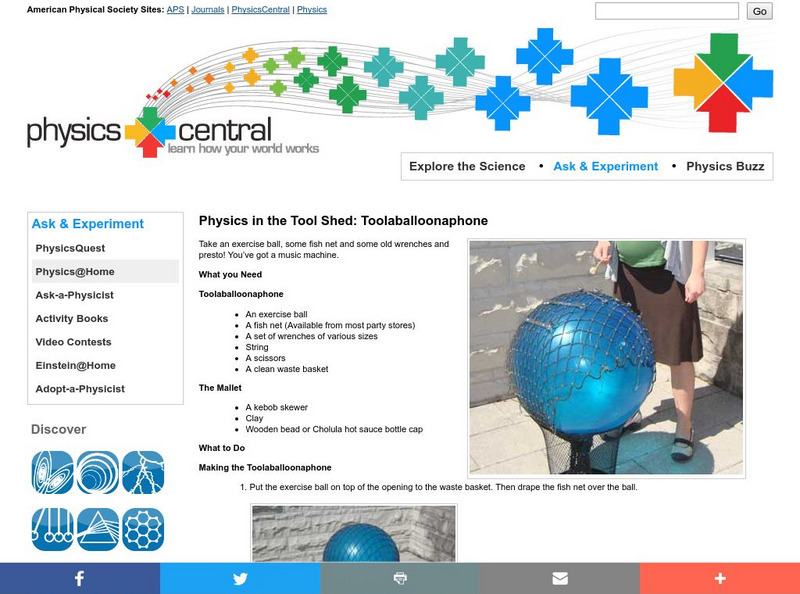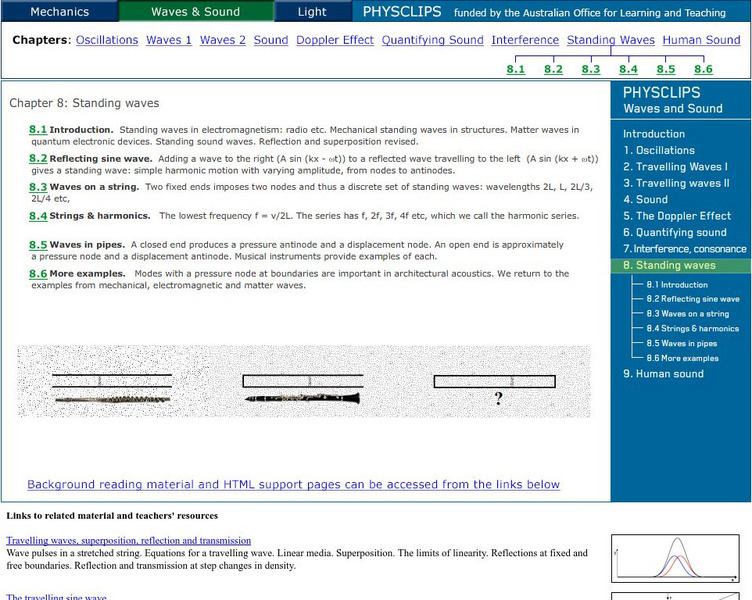Physics Classroom
The Physics Classroom: Sound Waves and Music:fundamental Frequency and Harmonics
For musical instruments and other objects that vibrate in regular and periodic fashion, the harmonic frequencies are related to each other by simple whole number ratios. Students learn why these whole number ratios exist for a musical...
Physics Classroom
The Physics Classroom: Echo vs. Reverberation
Learn the difference between an echo and a reverberation on this reference page. Page includes an animation to show the difference.
Georgia State University
Georgia State University: Hyper Physics: Non Focusing Surfaces
This hypertext physics course tutorial on nonfocusing surfaces relates various design principles to good auditorium design. Illustrated.
University of Kentucky
The Physics and Math of Music
Read about a math research project done by three college students which helps us see physics and math in music. Here's a great approach for integrating curriculum!
Georgia State University
Georgia State University: Hyper Physics: Brass Instruments
Understand the science of sound when performing with a brass instrument such as a trumpet or a trombone.
Other
Physics of Sound/image Analysis of Sound Pressure
A discussion on how to locate the sound image based upon the incident and reflected pulse of sound heard at a given location. For those looking for a challenge, follow the links to view derivations of wave equations for sound (uses...
Science Buddies
Science Buddies: How Does Color Affect Heating by Absorption of Light?
Light is an example of an electromagnetic wave. Electromagnetic waves can travel through the vacuum of interstellar space. They do not depend on an external medium-unlike a mechanical wave such as a sound wave which must travel through...
Georgia State University
Georgia State University: Hyper Physics: Musical Instruments
Homepage for a hypertext about the different families of musical instruments. From this page, users can retrieve information on a the acoustics of a variety of specific instruments: stringed instruments, woodwind instruments, brass...
Khan Academy
Khan Academy: Wave Characteristics Review
Review the characteristics of periodic transverse and longitudinal waves such as wavelength, crest, trough, amplitude, expansion, and compression.
Ducksters
Ducksters: Physics for Kids: Sound Pitch and Acoustics
Kids learn more about the science and physics of sound. Pitch, acoustics, and the doppler effect. How the frequency of the sound wave affects the pitch we hear.
Science and Mathematics Initiative for Learning Enhancement (SMILE)
Smile: Sound (Primary)
This site provides two activities that can be used in the primary elementary classroom. The purpose is to "demonstrate different ways to produce sound."
Physics Central
Physics Central: Physics in the Tool Shed: Toolaballoonaphone
Learn about compression waves and amplification through constructing a toolaballoonaphone! The toolaballoonaphone is made out an exercise ball, fish nets, wrenches, strings, scissors, and a clean waste basket that allows students to...
Other
Physics and Psychophysics of Music
This site is filled with information pertaining to the physics of sound and music.
The Franklin Institute
Franklin Institute: Music to Our Ears
Discover the connection between sound waves and hearing with this webpage tutorial. Be sure to click on the picture for detailed information.
Physics Aviary
Physics Aviary: Resonance Tube Lab
This lab is designed to help students visualize the formation of standing waves in a wind instrument. Students will be able to view fundamental waves as well as some higher harmonics. They can work with a tube with two open ends or just...
Physics Aviary
Physics Aviary: Doppler Lab
This lab is designed to have students investigate the changes to wavelength and frequency that occur when the source of the waves is in motion. This video describes the lab: https://youtu.be/eCceYPBR6f4
CK-12 Foundation
Ck 12 Exploration Series: Simulations: Physics: Pan Flute
[Free Registration/Login Required] A simulation to learn about wave harmonics in a column of air by looking closely at the sound produced by a pan flute.
University of New South Wales (Australia)
University of New South Wales: School of Physics: Physclips: Standing Waves
Understand how standing waves occur in this learning module that includes animations and videos.
University of New South Wales (Australia)
University of New South Wales: School of Physics: Physclips: Human Sound
Get all the information you need to know about human sound in this learning module. Module covers voice production, ear's part in hearing, resonances, and pitch.
Texas Education Agency
Texas Gateway: Physics of Hearing: Sound
describe sound as a longitudinal wave.By the end of this section, you will be able to define sound and hearing and
Other
Byju's: Physics: Reflection of Waves
Explains what happens to a wave when it hits a fixed end or a free end.
Concord Consortium
Concord Consortium: Stem Resources: How Loud, How High?
What are ways to describe sound? Using the program downloaded called Sound Grapher and the microphone on the computer, students can investigate the frequency, wavelength, amplitude, and velocity of sound waves. Activity includes detailed...
Physics Aviary
Physics Aviary: Speed of Sound Lab
This lab is designed to have students investigate the relationship between the distance from an explosion and the time it takes the sound of the explosion to reach the observer. The temperature of the air can be changed by changing the...
Physics Classroom
The Physics Classroom: Resonance and Standing Waves
Educational tutorial features a physics classroom tutorial on natural frequency.

















